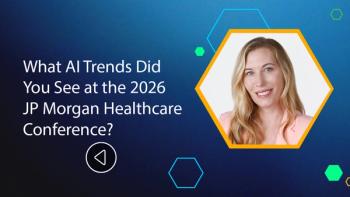
Gen-Z Behavior and Their Influence on Pharma Marketing and Advertising
Ian Baer, Founder and Chief Soothsayer, Sooth, discusses their recent data and research about some massive behavioral shifts occurring across Gen-Z
Tell me about your background and what led to the founding of your company, Sooth.
Oh gosh, my background, I spent 35 years in the agency business, and have a pretty unique background for an agency person because usually you're like your career, you know, account leader or your Career Strategist or your career creative. Actually, my career spent doing all three, it divides up about half the time in strategy, but I started and account management, I had been president of a few agencies, I've been Chief Strategy Officer, three agencies, I was Chief Creative Officer at an agency for seven years. So, I wore every hat you can wear in the agency space and decided to pivot out of the agency business at the end of 2022. Because I had codified a very unique way of strategic problem solving and approaching marketing strategy. Once I realized that it was a repeatable, that actually it was worthy of patent protection. We have a patent pending now for our method spun out of the agency world and launched soon. So, we've been up and running now for a bit over a year. It's a practice dedicated to helping brands connect on an emotional level with the people who buy their products and services.
What did your research around Gen-Z behavior look like and why did you choose to focus on them specifically?
So, Gen Z, they fascinate me for a number of reasons. First of all, I'm always interested in the evolution of how people socialize how people get things done, how people conduct business, we watched a tremendous acceleration of change through the pandemic, where, you know, we used to have these digital consumers and these more traditional consumers. And then because everyone was forced to use technology in ways that a lot of people might have been comfortable with, or they'd never used before, it all sort of came together and we became one technology enabled consumer universe. And through that, as Gen Z was suddenly aging into adulthood, they became a really important verb to watch that at the same time, I started to notice in the media, in advertising, even in my personal life, a lot of stereotyping and unfortunate tropes with regard to Gen Z. That that told me they were really misunderstood especially by brands. Being seen as you know, selfie obsessed, and social media obsessed and not nearly as serious a generation as they are.
So early on at Sooth, because we are all about empathy and understanding and giving the people who buy from brands more of a voice and how brands market to them; I kind of took Gen Z under my wing a little bit as a as a pet project. As we would join different parts of our own methodologies to say what sorts of understandings can we tease out, that might be escaping people out there. Eventually, that led us down a number of paths, including, last summer, we made a decision to start a Gen Z audience Council, where we've actually recruited undergraduate students, grad students and working professionals, from ages 18 to 25, to consult with us and actually help us help brands do a smarter, more effective, more empathetic job of connecting with this misunderstood generation.
So, it's really become a labor of love. Gen Z is every day changing the way consumers in our society, socialize shop, by how they relate to brands, how they choose to spend their money, how they choose to spend their time, they're having an outsized impact, not only on our economy, but on the way even older generations get things done. So, we want to shine a big light on Gen Z, because we think they're not just an age cohort, we think they're the most impactful age cohort to focus on, really over the next 20 years.
Newsletter
Lead with insight with the Pharmaceutical Executive newsletter, featuring strategic analysis, leadership trends, and market intelligence for biopharma decision-makers.




